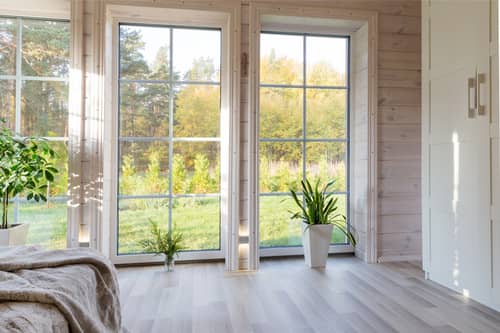Vinyl or composite windows, which is better? The choice of windows for your newly built or redesigned house can make or break the house’s entire look. The doors and windows of your house are the most striking features that people tend to notice. A well-designed window makes your house all the more appealing to everyone, from people passing by to visitors to the members of your own home.
Apart from the design, it is also important to have windows that are robust, provide weather shielding, and are durable. Windows are also the element of your house that regulates the overall lighting and air circulation within.
Thus, it becomes essential to keep these multiple factors in mind while buying replacement windows near you. In this regard, vinyl and composite windows are both very popular choices, and therefore it is very easy to get confused between the two.
Here, we provide an in-depth exploration of both these windows and their pros and cons to make your decisions easier.
General Information
Vinyl windows are a recent (first used in the 1970s) innovation that acts as an affordable alternative to wood windows.
Composite windows are developed using different materials, which vary in the inner and outer surface. This ensures a durable interior build and high insulation on the exterior. They are often known as hybrid windows and are newer in the market compared to vinyl windows.
Material
- Vinyl windows
These are primarily made up of Polyvinyl Chloride (PVC), a plastic derivative. PVC is the second most-produced plastic globally, mainly used in the construction of windows or doors, followed by pipes and wires, cables, and medical instruments.
After its discovery in 1964 and subsequent introduction in the 1970s, the demand for PVC skyrocketed due to its low cost but high utility. PVC can be easily melted and molded into different shapes, making it versatile with regard to design. Also, after usage, it can again be remodeled to make different products through recycling. Recycling does not disrupt the inherent chemical properties of this material
- Composite windows
The core or inner surface is often made up of timber or resin and fiberglass, making composite windows tough and durable. While the outer surface most commonly has aluminum cladding that provides high insulation and a weather shield. Combining the best of both worlds with these materials, a composite window is all you need.
Build and Durability
- Vinyl Windows
Vinyl windows are of strong build. These windows tend to be very lightweight; hence it is a common belief that they are not strong enough. Recently this myth has been debunked. These windows are known to efficiently protect your house from strong winds, snowstorms, and high-speed winds.
There were also widespread speculations about the warping of vinyl windows; it was assumed that excessive heat could melt the material as it is essentially plastic. Tests reveal that vinyl windows are not prone to warping due to excessive heat or sun exposure. In case of excessive moisture, vinyl windows will hold their shape.
Vinyl windows are known to last up to 20 years on average. They are low maintenance and can be cleaned periodically. This durability factor means you do not need to worry about replacements or repairs due to damages. Even though lightweight, vinyl window frames have enough glass space and can hold the window glass perfectly without creating any distortion.
- Composite Windows
When built with good quality materials, composite windows can last up to 40 years. Composite windows provide high resistance to both extreme heat and extreme cold conditions. There are no reports of composite windows expanding or contracting with respect to fluctuations in temperature. The strong build of the core thus guarantees a durable window that will shield you and your family against extreme weather.
Varieties
- Vinyl Windows
Initially, they were only available in limited design and color options, but as discussed earlier, the great thing about vinyl windows is their reusability. They can be melted and modeled easily into different shapes and sizes as per your requirement. This means no matter what design your home is, you can customize your window designs accordingly with durable material without any hassle.
- Composite Windows
There are varieties of composite windows based on the material used. Currently, there are two major varieties – aluminum-clad timber and aluminum-clad Unplasticised Polyvinyl Chloride (UPVC). Most people prefer the latter as timber is prone to rot and damage compared to UPVC.
Designs and Aesthetics
- Vinyl Windows
You may wish for double-hung windows or bay windows to add that extra aesthetic to your home design. Fret not. PVC can be easily used to build up a myriad of window designs without a high cost. No matter which window style you dream of, they are all available in vinyl!
- Composite Windows
The concept of composite windows is fairly modern, and the designs are more suitable for modern designed homes. The overall look of a composite window is elegant and aesthetically pleasing, imitating the look of wood windows. There is no issue with paint compatibility, making it customizable.
Cost
- Vinyl Windows
The major reason driving the discovery and development of PVC is its cost-effectiveness. The overall cost of installing vinyl windows is often multifold lesser than other materials like wood or steel. Given the durability of vinyl windows and the low cost, these windows are the best deal.
- Composite Windows
In case you go for the timber core and aluminum clad composite window, it is likely that the cost would be on the higher end of the spectrum. However, given the average durability of 40 years, many consider this a beneficial investment.
Pros
- Vinyl Windows
One of the most interesting and desirable features of a vinyl-based window is its energy efficiency. This means that the vinyl windows have insulation capabilities that entrap your house’s internal heat, thereby regulating the temperature within. This imparts two main benefits – a considerable reduction in your monthly utility bills and sustainable energy use making it eco-friendly.
- Composite Windows
Provide enough energy efficiency as well, depending upon the material combinations used. There is considerable energy efficiency in the case of a timber core, although the outer aluminum cladding surfaces may reflect the external temperatures.
Cons
- Vinyl Windows
Difficult to paint as most paints are not compatible with vinyl. They tend to discolor over time.
- Composite Windows
Higher installation cost due to timber requirement. The raw materials are procured from fossil fuels- thus not great for the emissions on the eco-friendly front, and designs may not complement traditional homes. There have been some reports of damage during hail storms which cause dents in the aluminum exterior.
That said, if you are looking for home services near you, contact us today.



